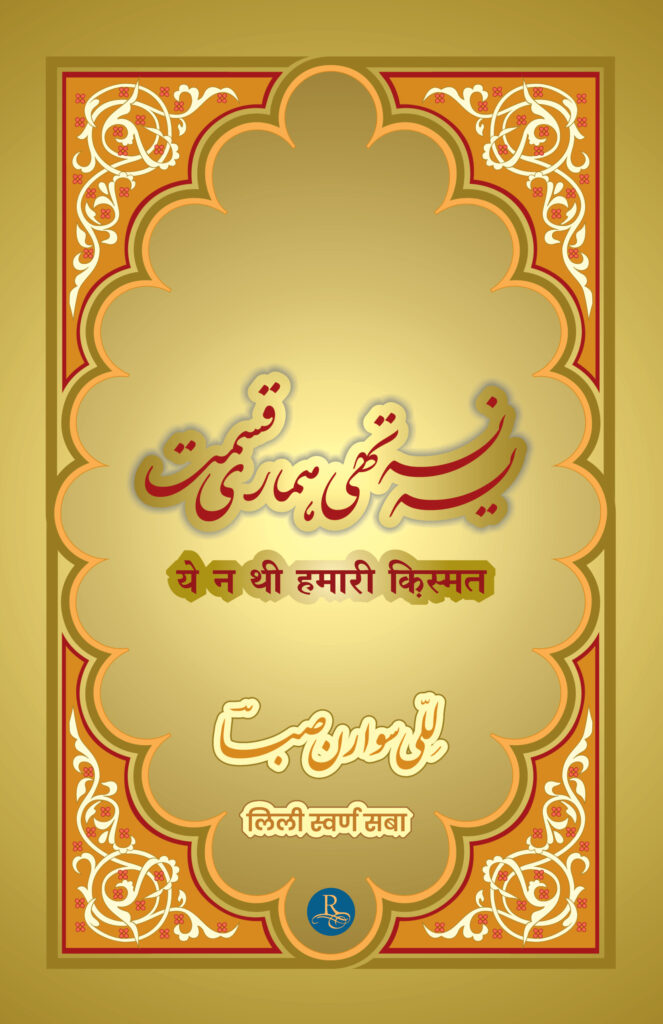Review of Lily Swarn Saba’s collection of ghazals.
Prof. Zaman Azurda
Recently, I happened to read and listen to some poems and ghazals of Lily Swarn Saba. Blessed be the circumstances which bring us the joy of the words and poetry of people living far away while sitting at home.
Once upon a time there was a ritual called arsi mushaf at Muslim weddings.
The arsi mushaf is the occasion when the groom first sees the face of the bride in a mirror held between them. Now television, different websites and various channels have put a mirror in front of everything. WhatsApp, Instagram and email have provided such facilities that you can meet anyone across mountains and oceans at the drop of a hat or chat online and God alone knows what else! I had written long ago in one of my essays that a time will come when elders will tell their grandchildren that in our era there used to be schools, post offices, libraries and markets. My friends scoffed at me and, today, while sitting at home, they shop, sell their goods, study and teach.
It is through this miracle of science that I got the opportunity of listening to and reading Saba’s ghazals. In any case, Punjabi countenances are very transparent, attractive and pleasing. If, along with this, a couplet also comes onto the lips, then it seems as if sweetness and sugar candy have come together with the perfect meeting of the lips. Punjabi is, anyway, a very sweet language despite some allegations. But it depends on the person who speaks it as to how they balance the harshness and sweetness of the words. As Ghalib said:
kitne shireen hain tere lab ke raqeeb
galiyan kha ke bemaza na hua
Thank God that every gesture of Saba is charming and every glance alluring. Her manner of speaking is so sweet that howsoever surly or ill-tempered the person listening to her may be, in just a moment, he melts and turns into honey.
Sometimes, one has to believe how much words can affect the mood of a person. There is a Chinese story that a philosopher heard from someone that a practitioner prescribed some words to the sick as a cure. The philosopher got angry how words could cure a disease. This man must be a fraudster who traps people in his net, he thought. One day, the philosopher reached out to the man. As soon as he saw him, he angrily told him what he felt about him. The physician asked him to sit down and, after a while, he started abusing the philosopher who obviously got angry. His face turned red, his heart beat got faster, pulse rate increased, blood pressure increased and his mood kept swinging. He pounced on the healer in ire.
Soon, the therapist changed his tone, apologized and said: ‘Two or three times a year, I lose my head and get such an attack that I start talking hysterically. Even today, the same thing happened, I feel extremely ashamed’.
While he was speaking softly, the condition of the philosopher started improving. His face gradually got back its color, the speed of the heart beat was back to normal, the pulse got normal as well.
“Now, have you realized the power of words or not?” the curer asked. The philosopher nodded in wonderment.
The manner in which words are spoken and who utters them matters .When these words come in the form of ghazals, they create changes in their inferences and conjectures. When the speaker’s disposition is Punjabi, which has artlessness, unaffectedness, spontaneity and the speech is guileless and straightforward, then a ghazal written in Urdu is not just a ghazal, but it is suffused with such a substance within itself that bursts out all kinds of glistening lights and makes everything shimmer and melt.
If you want to see all this at one place and be happy with them, then keep looking at Saba with your eyes, keep listening to her with your ears and keep soaking her ghazals not only into your mind and heart but also into your soul. As a sample, I present a few couplets for you:
tujhko aane mein dair lagti hai
phir manane mein dair lagti hai
surkh jode mein thak gayi hai dulhan
sharm jaane mein dair lagti hai
Or these couplets:
roze-e-mahshar badi nadamat se
muaaf karwayenge karam apne
sara aalam yeh ghair jaisa hai
aap hain bas Khuda qasam apne
These couplets show a quiet confidence.
How fascinating is this poetry! It is as if whispers and sweet nothings are being heard by the reader or the listener. The intriguing part is that when a man closes his eyes after listening to these couplets, he searches for those fluttering, dancing images which play hide and seek in his mind’s eye .The wonder of Saba is that she creates immense wealth in few words. Here, the words and their meaning blend with each other like air and fragrance. The sweetness of Punjab in Saba’s ghazals, the comfort and relief of the breeze coming from Himachal and the fusion with the Urdu world present such a likeness of a Turkish miniature painting which looks like a Jewel and gem-studded Arabic script even without any brush and color, which is apparently simple but many types of hues and colors fall flat in front of it. Believe me, this is the magic of Urdu language, which can hypnotise a reader or listener.
Prof. Zaman Azurda is an author, researcher, translator and a film writer.


